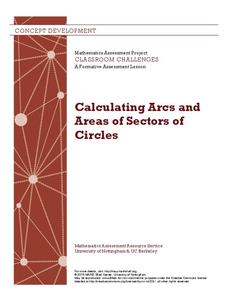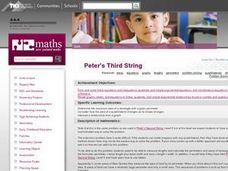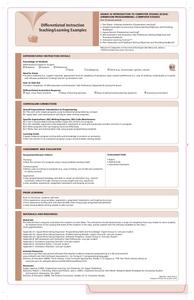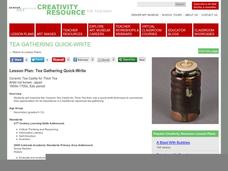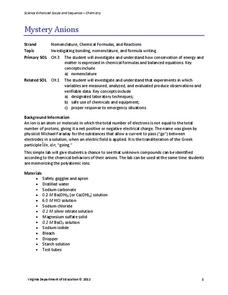EngageNY
From Equations to Inequalities
Sometimes, equality just doesn't happen. Scholars apply their knowledge of solving equations to identify values that satisfy inequalities in the 34th installment of a 36-part module. They test given sets of numbers to find those that are...
EngageNY
Graphing Systems of Equations
Expand on learners' understanding of quadratic-linear systems. Building on the graphic understanding developed in the previous lesson, pupils learn algebraic methods of solving the systems.
EngageNY
Geometric Sequences and Exponential Growth and Decay
Connect geometric sequences to exponential functions. The 26th installment of a 35-part module has scholars model situations using geometric sequences. Writing recursive and explicit formulas allow scholars to solve problems in context.
Mathematics Assessment Project
Calculating Arcs and Areas of Sectors of Circles
Going around in circles trying to find a resource on sectors of circles? Here is an activity where pupils first complete an assessment task to determine the areas and perimeters of sectors of circles. They then participate in an...
West Contra Costa Unified School District
Solving Equations Using Balance Scale, Decomposition, and Graphing
There's more than one way to solve an equation — three, actually. Scholars learn how to solve simple linear equations in one variable using three different methods, which include using balance scales, using decomposition (e.g., turning...
Curated OER
Peter's Third String
Explore the solution to a word problem involving area and perimeter. Learners read and discuss how to approach the problem. In small groups, they determine the maximum area of a rectangle with a given perimeter using a piece of string....
Curated OER
Systems of Linear Equations
Introduce the inverse matrix method to solve systems of linear equations both algebraically and graphically. Using given data, your class checks their answers with graphing calculators. Handouts are included in this well-thought out lesson.
Ontario
Animation Programming—Computer Studies
Introduce high schoolers interested in animation programming to fundamental programming concepts so that they can plan and write simple programs.
Virginia Department of Education
Partial Pressure
At some point, everyone has been under pressure—even Dalton! Explore Dalton's law of partial pressures with young chemists as they measure the volume of air extracted from a sample compared to its original volume. Class...
Denver Art Museum
Tea Gathering Quick-Write
Japanese tea gatherings are the inspiration for a great lesson. Learners are provided with an image of a tea caddy made for thick tea and asked to describe what they notice and what that might mean. This leads into a larger lesson about...
Curated OER
Inquiry into Consumer Products
Students recognize different consumer products, found in and around the home, that have reactive or denaturing properties when used together. They explore chemical and physical properties of each product by identifying chemical formulas...
Curated OER
Measurement: 2D and 3D
Students solve volume problems. In this geometry lesson, the class watches a video about clean water (link provided) and individuals compare the volume of different prisms, including an actual drinking glass. Extension activities include...
Virginia Department of Education
Mystery Anions
Lost an electron? You should keep an ion them. Young chemists learn qualitative analysis in the second lesson of an 11-part chemistry series. After observing reactions of simple salts, the teacher provides pupils with unknown...
Virginia Department of Education
Equilibrium and Le Chatelier’s Principle
The best part of learning about equilibrium is that nothing changes. Young chemists observe four demonstrations during this lesson: equilibrium in a saturated solution, equilibrium with an acid-base indicator, equilibrium with cobalt...
EngageNY
Graphing the Tangent Function
Help learners discover the unique characteristics of the tangent function. Working in teams, pupils create tables of values for different intervals of the tangent function. Through teamwork, they discover the periodicity, frequency, and...
Ohio State University
Ohm's Law
Have you ever wanted to build a conductor? Here is a lesson that takes pupils through building a conductor based on Drude's model in order to better understand electricity.
EngageNY
Representing, Naming, and Evaluating Functions (Part 2)
Notation in mathematics can be intimidating. Use this lesson to expose pupils to the various ways of representing a function and the accompanying notation. The material also addresses the importance of including a domain if necessary....
Illustrative Mathematics
Finding an Unknown Angle
Teach your class how to apply their knowledge of geometry as they explore the unknown. In order to find an unknown angle, learners must understand that rectangles have four interior right angles, that right angles have 90 degrees, and...
Mathematics Assessment Project
Designing 3d Products: Candy Cartons
Wouldn't it be great to work in a candy factory? Learners get their chance as they first design a carton for a candy that meets certain requirements. They then examine and analyze nets and explanations in sample student responses.
Mathematics Assessment Project
Modeling Motion: Rolling Cups
Connect the size of a rolling cup to the size of circle it makes. Pupils view videos of cups of different sizes rolling in a circle. Using the videos and additional data, they attempt to determine a relationship between cup...
Pennsylvania Department of Education
Using Expressions and Equations
Sixth graders analyze expressions and equations. In this algebra lesson, 6th graders write algebraic sentences and solve for an unknown in a one-step equation. This lesson uses the formulas for the perimeter of a square and rectangle as...
Curated OER
Commutative, Associative, and Distributive Properties
Pupils explore the concepts of commutative, associative, and distributive properties. In this beginning algebra lesson, students discuss the terms "commute", "associate", and "distribute" and how they correlate with the related...
Curated OER
You Gotta Have Heart
Ninth graders investigate the concept of relations and interpret graphs and tables. They analyze given data and look for a pattern to determine if the numbers represent a function. Students practice solving scientific word problems that...
Curated OER
Representing the Unknown
Student use mental math to solve linear equations. In this algebra lesson, students solve one and two steps equations. They write expressions using variables to identify the unknown.



